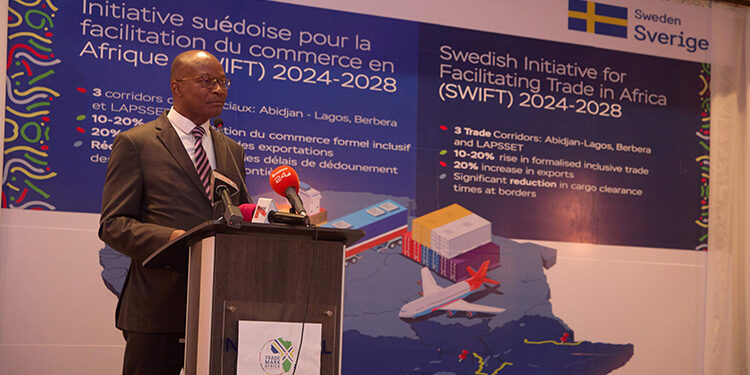The Government of Sweden has launched a four-year, $9.3 million multi-country programme—the Swedish Initiative for Facilitating Trade in Africa (SWIFT)—aimed at addressing long-standing logistical and policy challenges that continue to hinder trade along three of Africa’s most critical transport corridors: the Berbera Corridor, the Lamu Port-South Sudan-Ethiopia Transport Corridor (LAPSSET), and the Abidjan-Lagos Corridor.
While each corridor is at a different stage of development, they all suffer from structural inefficiencies that limit their effectiveness as trade routes. The Berbera Corridor, linking the port of Berbera in Somaliland to landlocked Ethiopia, has gained renewed strategic attention but still requires substantial investment in infrastructure, customs systems, and security to become a fully functioning regional trade artery.
The LAPSSET corridor—Kenya’s most ambitious infrastructure project—is gradually taking shape, with Lamu Port partially operational, but the supporting road, rail, and pipeline networks are still incomplete. In West Africa, the Abidjan-Lagos Corridor is arguably the most developed of the three, with significant cross-border trade activity already taking place, but it faces congestion, weak inter-agency coordination, and outdated border infrastructure.
SWIFT, which will be implemented by TradeMark Africa in partnership with national governments, the private sector, and regional institutions such as ECOWAS, seeks to address these challenges through a suite of targeted interventions. These include the digitization of customs systems, improvements in interagency connectivity between trading partners—particularly in West Africa—border infrastructure upgrades, and the creation of a donor coordination roundtable to harmonize investments and eliminate duplication.
The programme will also pay special attention to informal cross-border trade, which is largely dominated by women and youth. Investments will be directed towards training, the construction of secure and dignified waiting spaces for women, the provision of electricity at border points to enhance safety and efficiency, and protection from the elements along pedestrian lanes—all designed to remove specific barriers and support the formalization of trade.
By 2028, SWIFT aims to halve cargo clearance times at key border crossings, increase exports by 20%, and boost formalized trade by women and youth by up to 20%. A key component of the programme will be the generation of detailed data on women’s participation along these trade routes, enabling the design of more inclusive trade policies and systems.
“The SWIFT programme reflects our shared ambition to fast-track Africa’s trade future,” said David Beer, Chief Executive Officer of TradeMark Africa. “Through collaborative partnerships and bold innovation, SWIFT will build efficient, future-ready trade systems that drive growth and inclusion.”
Speaking on behalf of the Swedish government, Joachim Beijmo, Head of Regional Development Cooperation in Africa, added, “Through SWIFT, Sweden reaffirms its strong belief that trade—when inclusive and sustainable—can be a powerful driver of development. By investing in the digital and physical infrastructure that connects people and markets, we are helping unlock the full potential of African entrepreneurship and regional integration.”
This article was published by Githua Kihara, an editorial consultant for FEAFFA’s Freight Logistics Magazine. For any inquiries, please contact us via email at editorial@feaffa.com or freightlogistics@feaffa.com, or reach out to Andrew Onionga directly at onionga@feaffa.com / +254733780240.





